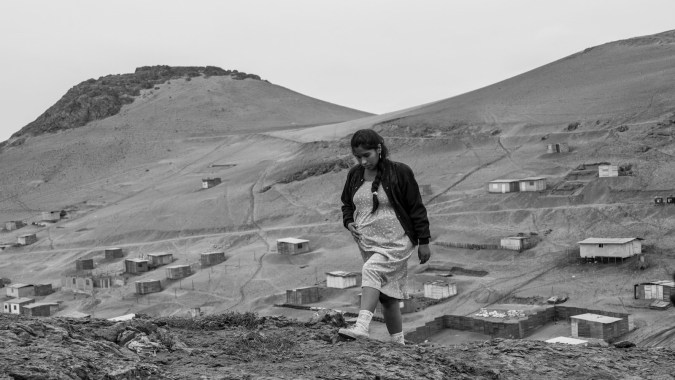Focused on the quotidian pain that precedes great turmoil, Peruvian director Melina León approached her country’s communal trauma through the individual story of an indigenous mother searching for her newborn daughter. The result is her feature film debut, Canción sin nombre (Song Without a Name), which premiered at the Cannes’ Directors’ Fortnight last year.
The film is loosely inspired by a phone call León’s father, a journalist for Peru’s La República, received soon after he’d published a series of articles about children being trafficked out of the country. The woman on the phone claimed she’d been stolen from her parents as a child and wanted to thank him for his work uncovering such horrific stories, hers wasn’t an isolated case.
Set in 1988, a time when massive inflation and the armed conflict between the corrupt military and the terrorist organization Shining Path kept the population, especially farmers, under threat, León’s film dramatizes that perilous moment in Peruvian history.
“That’s the year we realized we had given the country to a crazy man, president Alan García,” León tells Remezcla during the Palm Springs International Film Festival where she recently won the New Voices/New Visions Grand Jury Prize.
Borrowing notes from auteurs such as Béla Tarr and Michelangelo Antonioni, León opted for shooting the film in black and white to reflect the color palette of newspapers at the time and using the 4:3 aspect ratio to match the format broadcast television used back then. These formal elements, both of which speak to the key role the news media plays in the plot, exquisitely complement the devastating acting at play.

In the lead role of Georgina Condori, a Quechua woman from Ayacucho who contacts the press to investigate the mafia behind the disappearances, actress Pamela Mendoza emanates harrowing heartbreak and frustration. “I didn’t want a famous actress,” León notes. “I wanted someone who had similar life experiences that helped her understand the character profoundly.”
Mendoza, a native of the Villa María del Triunfo in the outskirts of Lima, wasn’t a professional actress. She was involved, though, in using political performance art to advance women’s rights through a group called Atrévete Magdalena. León became aware of her while visiting nearby area called Villa El Salvador, known for its community theaters. Art has served as a tool to counteract, even if insufficiently, the socioeconomic inequality imposed on these populations.
“If these things happen it’s because there’s a complete dehumanization of indigenous people as beings without rights and without a future…”
León believes that because of the way Peruvian society is structured, poisoned as it is by colonialism, it protects the status quo and the state of permanent abuse against the country’s indigenous majority. The collusion between men in power and criminal organizations portrayed in her feature is only a small reflection of a much larger problem.
“If these things happen it’s because there’s a complete dehumanization of indigenous people as beings without rights and without a future, with whom they could do whatever they wanted from the moment they stole their land,” she explains.
That social justice impulse slipped into the movie’s title. Originally called Canción de cuna or “lullaby,” the project was later baptized anew because León and her co-writer Michael White felt that first title lacked strength. They wanted it to be less obvious and to express loss instead.
“The name Canción sin nombre reminds us of the beauty and the violence that collide in the film. The song is that which every mother sings to her child to fall asleep; ‘sin nombre’ evokes the specific situation of this mother who was left without the chance to sing to her child, without the chance to name her child,” she explains. “It’s about all that love that wasn’t realized, that was left without someone to give it to.”
On the brighter side of things, as a direct result of the implementation of a Ministry of Culture that has supported film industry endeavors over the last decade, Peruvian productions with indigenous narratives have become more prominent and consistent. Recent standouts include Álvaro Delgado Aparicio’s Retablo (in the Quechua language) and Óscar Catacora’s Wiñaypacha (in the Aymara language). Even more importantly, they are no longer just appreciated by film festival attendees.
León feels that prejudice against Peruvian cinema has slowly been dissipating and local audiences are starting to get behind homegrown talent. As an example, she points to the success of Gonzalo Benavente Secco’s documentary La revolución y la tierra, which sold over 50,000 tickets during its commercial run, breaking all sorts of records for a nationally produced nonfiction work.
“There’s now an interest from Peruvian audiences in our own cinema,” the director adds. She hopes this momentum and interest benefits Song Without a Name when it finally opens at home in the spring.
This interview was conducted in Spanish and translated by the author for Remezcla.
Song Without a Name screened as part of the Palm Springs International Film Festival. Film Movement will release the film in U.S. theaters in 2020.




